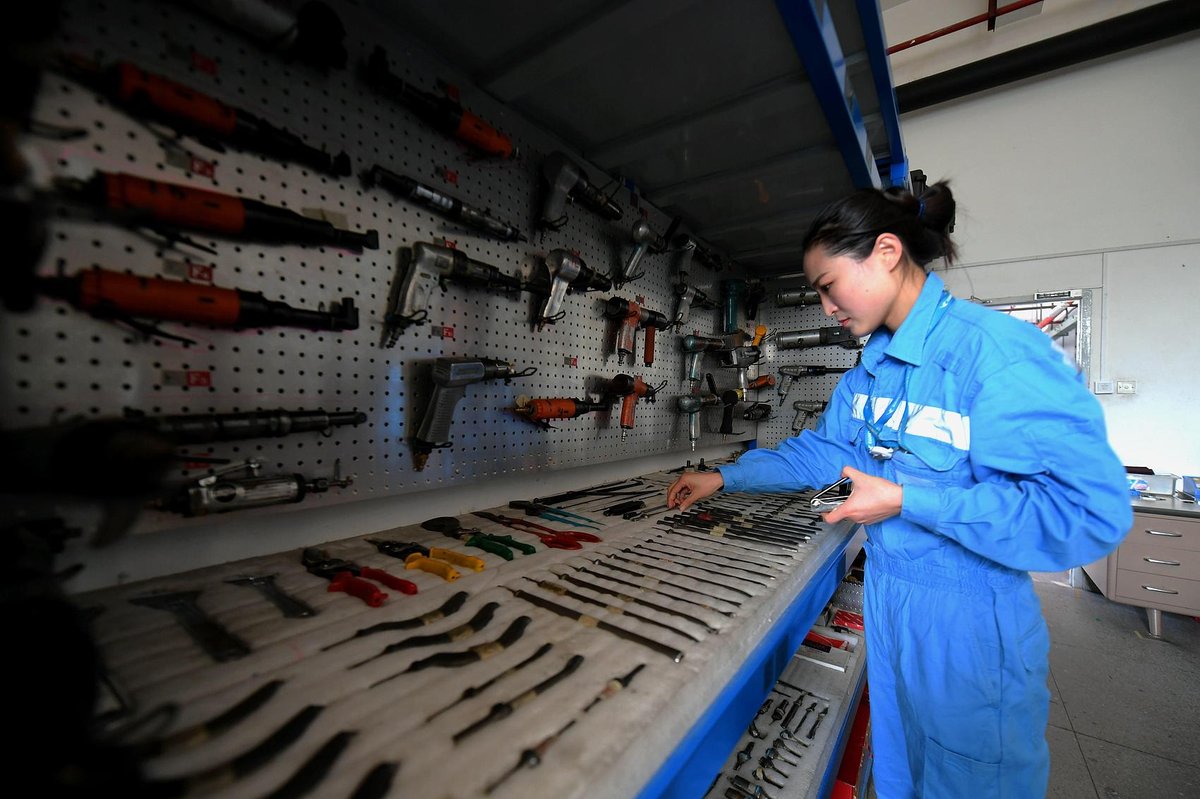Women in China are calling for more representation in door-to-door maintenance, yet those already in the field continue to face societal discrimination
When Wang Yiran (pseudonym), the co-founder of Shenzhen-based feminist collective FeyGal, refurbished a new house by herself, she’d been proud: she had planned the entire renovation, taught herself to use power tools, and cut and moved wood panels half her weight. But when faced with more technical tasks, such as the positioning of electrical sockets, she had no choice but to hire outside help. Without having agreed on a price beforehand, the repairman who arrived asked for an exorbitant fee. “Because I was the only person at home at that time, I had to obediently pay,” she tells TWOC. When the man left a trail of muddy shoeprints behind him, she didn’t feel comfortable voicing a complaint.
Door-to-door home maintenance, a male-dominated industry, has become a hot topic recently. Women who work in the industry are often subject to gender-based discrimination. Meanwhile, women who live alone have frequently expressed their discomfort with being in the house with a repairman. The result: more women are now talking online about maintenance work than ever before.
Read more about feminist discussions in China:
- The Pushback Against Invasive Sexual Health Exams in China
- K-Pop Roadshows: A Space for Liberation or Objectification?
- Her Havens: The Struggle Over Female-Only Spaces
Peng Yushu, who lives in a hutong apartment in Beijing, recounts feeling distinctly unsafe during an exchange with her landlord, who sent a plumber to fix her blocked toilet. “[The landlord] said the plumber was known to make inappropriate remarks to women, but he told me to just disregard any rude behavior from him,” she tells TWOC. She kept her front door open while the plumber worked and was relieved when he left.
Peng, like an increasing number of women across China, has turned to digital spaces for maintenance support. “Xiaohongshu is helpful,” she says, referring to the social media app that boasts a majority-female user base. She searches for keywords appropriate to every issue she encounters, laughing as she recalls dealing with a pest infestation: “Women online won’t just prescribe you a general pesticide, but will be very specific. Some users will identify the exact species of insect in one’s bathroom.”
One Xiaohongshu account, Qiangji Nügong, is managed by an all-female team of licensed maintenance workers, offering in-depth tutorials on the basics of home repairs. It boasts over 100,000 followers. Others, such as the feminist account Reggie Leidui, document their renovation journeys on their personal accounts, encouraging women to undertake their own projects. Though self-taught and unlicensed, Reggie has garnered more than 27,000 followers, 96 percent of whom are women between the ages of 18 and 30. She tells TWOC that she wishes to demystify maintenance work for women. “I’m not a professional,” she says. “I do it purely for the love of the work.”
On Xiugou Wanshiwu, the women-only mini app launched last year on WeChat, women can post their queries in an online forum. Anyone can answer, and if a home visit is necessary, the client and the maintenance worker can negotiate a price. To gain access to the platform, women must provide their name, national ID number, and mobile phone number. Licensed maintenance workers must also provide a photograph of their certificate. There are more than 50,000 users on the platform, with the majority based in cities such as Beijing, Shanghai, and Guangzhou. Since its inception, the platform has expanded to include a variety of non-maintenance services: users can ask other women to water their plants or care for their pets while they’re away, request women to accompany them to medical appointments, and post advertisements for space rentals.
In an interview with Story FM, the platform founder Di Di said she wished for more licensed workers to join the platform, as there is currently more demand than supply of qualified professionals. Indeed, while most of the help requests receive answers in the form of suggestions—women offering tips and life hacks—many of the requests for a home visit go unanswered.
Women working in door-to-door maintenance remain a rarity in China. In an interview with TWOC, an anonymous Beijing-based representative of Ziroom, an apartment rental app that provides tenants with free door-to-door maintenance services, said there are currently no women under the company’s contract.
Wang, the founder of the feminist creative FeyGal, has taken things into her own hands, and created an offline class in July. She initially considered partnering with technical schools around Shenzhen, but realized that few of their teachers and students were women, so she decided to do it herself. “It takes more than raw strength to be a maintenance worker,” she tells TWOC. “I hope to help women realize they can do just as well in male-dominated industries as men.”
FeyGal’s initial Xiaohongshu post attracted dozens of queries. Wang divides those interested students into two categories: those who seek to enter the maintenance industry as professionals (the minority), and those who seek life skills for solo living (the majority). But, as she tells TWOC, most of the women she knows are not interested in learning maintenance skills for themselves, even as they wish for more female maintenance workers to enter the industry. She says that consumers still prefer to outsource maintenance work to specialists, particularly if they live in fast-paced cities such as Shenzhen.
But Xiao Ya (pseudonym), a licensed maintenance worker who has spent 10 years teaching repair work, says that female maintenance workers are often treated poorly on the job, even by their white-collar female clients: a reality that discourages women from joining the industry. “A few clients, upon opening the door and seeing that I’m a woman, will ask whether they can borrow my tools [so that they can do the repairs themselves],” she tells TWOC. “Sometimes, they’ll hire a male maintenance worker to come check my work right after I leave.” She recounts an awkward run-in with one such male worker after leaving a client’s apartment, stating that it is not only the technical challenges of the profession—the process of studying and testing for certification, and the physical strength demanded of a maintenance worker—that hinders women from joining, but also the mental strength required to work in a male-dominated industry.
When she tested for her certification, she had been one of two women in a class of 100. She credits her family—many of whom worked in electrical maintenance—as her inspiration. Otherwise, she tells TWOC, she would’ve been much more daunted.
Xiao Ya is now one of the teachers for Wang’s upcoming maintenance class. They are planning to include lessons in business conduct and personal safety. “I want our students to know how to enter the maintenance industry with confidence,” Xiao Ya says. What should female maintenance workers do if a client complains about their work, or if they are alone in a room with a man? How should they set a price and hold their ground during possible negotiations?
“People often underestimate the business side of maintenance,” Xiao Ya continues. “There isn’t a standardized rate for maintenance work, and that leaves women—whether they are maintenance workers or clients—vulnerable to exploitation.” Though door-to-door maintenance workers and repairmen must pass the same certification exam, they are often contracted out by individual landlords or rental agencies, who may not share the same standards for quality and professionalism. This lack of consistency, combined with the lack of transparency in pricing, often results in distrust between client and worker. Xiao Ya says that many clients, particularly women who live alone, fear being coerced into paying higher fees than necessary. This is particularly true in less urbanized areas, where people tend to rely on their close friends and family for repair work, instead of hiring outside help.
Ultimately, Xiao Ya says, the solution lies in a standardized education and contracting system for all maintenance workers. “There needs to be rules protecting both clients and workers,” she says. “Only then will more women respect the industry, and choose to enter it.”














